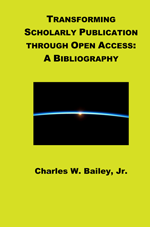The Pew Research Center's Internet & American Life Project has released Library Services in the Digital Age.
Here's an excerpt:
The availability of free computers and internet access now rivals book lending and reference expertise as a vital service of libraries. . . .
Moreover, a notable share of Americans say they would embrace even wider uses of technology at libraries such as:
- Online research services allowing patrons to pose questions and get answers from librarians. . . .
- Apps-based access to library materials and programs. . . .
- Access to technology "petting zoos" to try out new devices. . . .
- GPS-navigation apps to help patrons locate material inside library buildings. . . .
- "Redbox"-style lending machines or kiosks located throughout the community where people can check out books, movies or music without having to go to the library itself. . . .
- "Amazon"-style customized book/audio/video recommendation schemes that are based on patrons' prior library behavior. . . .
| Scholarly Electronic Publishing Weblog | Digital Scholarship |



